BLW Fears: Advice for Overcoming Infant Feeding Fears from 5 BLW Experts
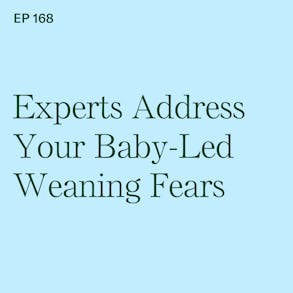
LISTEN TO THIS EPISODE
Episode Description
What’s holding you back from going FULL ON with baby-led weaning? Maybe you’re on the fence about whether you can truly skip traditional spoon-feeding...or you’re nervous about gagging and choking, or you’re worried your baby will have an allergic reaction when you try allergenic foods.
Today I’m interviewing 5 feeding experts about overcoming feeding fears. They’re talking you down from all the biggest BLW worries with expert advice
The expert guests addressing your feeding fears in this episode are:
- Amy Brown, PhD - prolific BLW researcher & professor from the United Kingdom
- Dawn Winkelmann, MS, CCC-SLP - feeding therapist & award winning feeding product designer
- Mona Amin, DO - pediatrician and BLW mom
- Carina Venter, PhD, RD - pediatric dietitian, researcher and contributor to global food allergy guidelines
- David Stukus, PhD - internationally renowned food allergy expert
Links from this Episode
- Baby-Led Weaning with Katie Ferraro program with the 100 First Foods™ Daily Meal Plan, join here: https://babyledweaning.co/program
- Baby-Led Weaning for Beginners free online workshop with 100 First Foods™ list to all attendees, register here: https://babyledweaning.co/baby-led-weaning-for-beginners
Other Episodes Related to this Topic

Latest Episodes

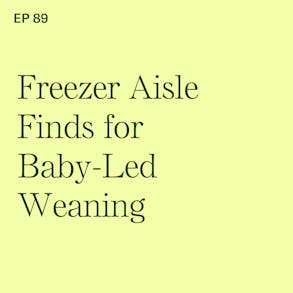
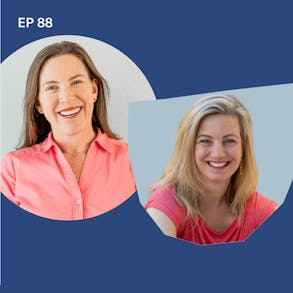
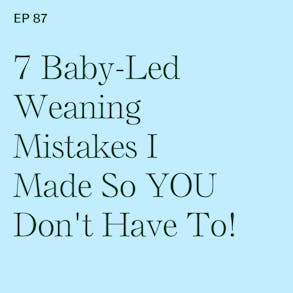
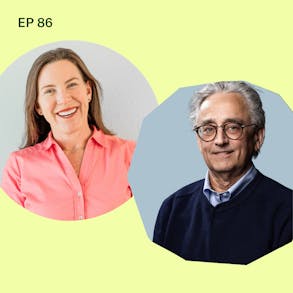
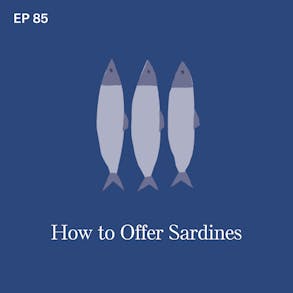
Katie Ferraro (1s):
inI decided to put the baby LED WEANING SUMMIT together. I've invited 17 credentialed feeding experts, and they're going to be sharing their knowledge and expertise and baby led weaning best practices to help ease this transition into solid foods for you and your baby. Hey there I'm Katie Ferraro, Registered Dietitian college nutrition professor and mom of seven specializing in baby led weaning here on the baby led weaning made easy podcast. I help you strip out all of the noise and nonsense about feeding, leading you with the competence and knowledge you need to give your baby a safe start to solid foods using baby led weaning.
Katie Ferraro (41s):
All right guys, tell me, honestly, what's the scariest part about your baby starting solid foods? Is that your baby's gagging and you think maybe they're going to choke on food? Is it your baby's not hardly eating anything at all? And you're wondering if you're doing this whole thing wrong, or what about dealing with other people? Maybe don't understand why you're skipping traditional parent led spoon-feeding. Well, there are lots of fears that can hold us back from helping our babies achieve their self feeding success. And in today's episode, I'm going to walk you through some of the biggest baby led weaning fears, and I'm going to have my fellow feeding experts address them individually for you. So each of the five baby led weaning Experts featured on today's episode are all going to be presenters at the upcoming baby LED WEANING SUMMIT.
Katie Ferraro (1m 30s):
So the baby led weaning summit is a free online event that I'm hosting. It's featuring 17 different feeding experts from around the world. And they're gathered in one place over six days to teach you latest in infant feeding and to support your baby success in baby led weaning. There's never been an event like this before. We're billing it as the biggest baby led weaning event has already where the registrations are at. We can tell it's going to be huge. It's six action packed days of advanced baby led weaning training from the leading credentialed experts in the field. So it's going to run from October 18th to the 23rd of 2021. It's online, totally free to attend. All you have to do to register is go to Blwsummit.com and then once you're signed up, when the summit starts each day of the summit, you'll receive an email that will have links to that days.
Katie Ferraro (2m 20s):
Expert, speaker presentations and baby led weaning trainings, exclusive baby feeding discounts. It's basically like one big online baby led weaning party, and it's totally free. So why are we doing this summit? Well, I know when you guys are trying to figure out baby led weaning that it can be confusing and parents to be honest are too often still getting conflicting, outdated, and even dangerous information about starting solid foods from non-credentialed unreliable sources. So I decided to put the baby LED WEANING SUMMIT together. I've invited 17 credentialed feeding experts, and they're going to be sharing their knowledge and expertise and baby led weaning best practices to help ease this transition into solid foods for you and your baby.
Katie Ferraro (3m 5s):
So the summit is for parents and caregivers, but also healthcare professionals who are interested in learning more about the emerging body of evidence that supports a baby led approach to starting solids as a safe and effective alternative to traditional spoonfeeding. So to get signed up, go to BLW summit.com snag your spot today. I only have one request for you guys for this event, please, please, please. Can you tell to people about the baby LED WEANING SUMMIT? Maybe it's a friend who's impressed by all the foods your baby is eating or it's another mom. Who's a little bit nervous like you are, and you guys are just starting out together and maybe you want an accountability, buddy, as you guys are pushing your baby's palettes together, you can also, if you want until your pediatrician, because we have lots of healthcare professionals on this summit, two dieticians, occupational therapist, speech therapist physicians.
Katie Ferraro (3m 51s):
Basically, if you're interested in baby Feeding, come to the baby, LED WEANING SUMMIT. Our keynote speaker is going to be none other than Gill Rapley. You guys may know her from a number of interviews I've done with her here on the podcast, but she's the founding philosopher of the baby led weaning movement. She's the author of the original baby led weaning book. We're going to have Marion Nessel joining us and Marsha Dunn, Klein and David Stukus. It's like who's who of the baby feeding world. And it's all online. It's totally free, but you got to get signed up to get all the links BLW summit.com. So let's go ahead and dive into the biggest fears and Advice for Overcoming Infant Feeding Fears from five of our baby led weaning experts who will be speaking at The BABY LED WEANING SUMMIT. All right, first up, let's talk about choking.
Katie Ferraro (4m 32s):
Okay. Choking is such a pain point for parents, and they're so worried that their baby is going to choke when you start solid foods, regardless of what modality you choose, but we're going to be doing tons of choking prevention education inside of the baby LED WEANING SUMMIT. So my first expert feeding guest today is Dr. Amy Brown. So Amy Brown does most of the baby led weaning researcher. She does a lot of it. And then she does a great job of interpreting the research that all of her colleagues are doing. Cause it can get a little dense. Sometimes I want to be honest, but she breaks it down and she's always teaching us listen, babies who do BLW no higher risk of choking than our babies who do traditional. Spoon-feeding provided that the parents are educated about reducing choking risks. So lots of choking advice coming your way.
Katie Ferraro (5m 13s):
Let's hear from Amy Brown,
Amy Brown (5m 15s):
Every single study that has been published as included choking risk amongst baby led, it's been fat babies shows that there's no increased risk and that makes complete physiological sense. I mean, when you start thinking about it, why, why would babies be choking on this? They are designed once they are able to pick food up and put it in their mouth, they have those tongue skills. They have those Jo skills they're able to eat those foods. That's fine. I think the choking method probably pushed by those who are pushing specialized baby foods because when she realized that babies don't need these really smooth purees or that kind of removes an entire market from existence, it's really difficult to design a study around choking, but we're being given occasional finger feed.
Amy Brown (6m 5s):
We're the ones who are actually most likely to choke because it was so novel to them. And they had learned to eat their food in a very different way. So if you think about the process of eating a puree with those really, really fine purees, as it's being put quite far back in the baby's mouth and the baby is essentially drinking it rarely. And that's a bit odd when you think about it, we shouldn't really be drinking our food, but when a baby is picking something up, it goes towards the front of their mouth. They're in control of that. They're learning to chew. So we thought was happening with that data with those spoonfed babies when they were being given those finger foods.
Amy Brown (6m 48s):
And sometimes the finger feeds are quite soft. So parents had worried so much, they're given really softly cooked carrots. So it was quite mushy that the baby was automatically just swallowing it straight down without thinking about chewing it because they were so used to their food being swallowable rather than needing needing sit. So it's a bit like sometimes adults can choke as well.
Katie Ferraro (7m 13s):
So Amy and her team are doing such important research to support baby led weaning as a safe and effective alternative to traditional parent led spoon-feeding. But so are a number of our other BLW summit speakers. And when it comes to the mechanics of swallowing, we have to have the leading SLP and baby led weaning. Dawn Winkelmann join us. She's also known as miss Dawnn SLP. She's going to talk about how to offer foods and what shapes to offer them in so that you guys can reduce choking risk here's Dawn. Yes.
Dawn Wilkelmann (7m 41s):
I'd like to offer strips of foods and as compared to cutting food up into very small bites and the rationale behind that is if your baby overstuffed and Baby is feeling that in their mouth, that there's too much food. If they're tiny pieces of food, baby, can't get that out of their mouth. They don't have the oral motor skills to spit out really forcefully or find that tiny piece of food that's been cut up with their tongue. They don't have those oral motor skills yet, but if you have them cut up in either a spear or a strip form, then they can pull out that strip that they have held into their little chunky little fist and pull that out.
Dawn Wilkelmann (8m 24s):
And so it decreases that risk of choking because they can actually save themselves if you will, and be able to pull that out.
Katie Ferraro (8m 33s):
Now, some of you get worried about choking for another reason. It's because your baby might be an overstuffed. And so what do you do if your baby has a tendency to shove food in his or her mouth? Well, Dawn has an answer for you guys too.
Dawn Wilkelmann (8m 47s):
There's so many things that we can do to be able to decrease the risk of over stuffing. The first thing that I tell families to do is be proactive. Get some meals ready before your baby really starts showing those extreme signs of hunger. So if your baby starts showing you a few cues that they're hungry, let's start the ball rolling because basically over stuffing can start to occur and it can be habitual for babies who have been waiting to eat and are really tuned into their hunger cues. And so they'll grab all that food and just stuff it into their mouth. And so the first thing is we can be proactive and start don't wait
Katie Ferraro (9m 24s):
Until the baby gets really, really hungry,
Dawn Wilkelmann (9m 26s):
Right? Where they're screaming or crying or just, you know, you can tell that baby's getting fussier. So we want to be proactive. And then the second thing is that we want to offer a high chair with a foot rest. Clinically. I find that babies have decreased over stuffing episodes when they're seated comfortably and safely in a high chair with a stable and adjustable foot rest, if they feel comfortable and they feel stable and they feel safe, they don't.
Katie Ferraro (9m 49s):
And a lot of you may know that Dawn Winkelmann is the Feeding expert and product designer for ezpz. They're a Feeding company that makes the original silicone suction mats and bowls that we use for baby led weaning. But Dawn also designed all of their open cups and they're Infant age appropriate utensils. So she's going to be presenting all about open cup and utensil milestone during her presentation, which is going to be on day two of the baby LED WEANING SUMMIT. So if you want to check out some of the ezpz Feeding products that Don designed, especially if you have a baby six to 12 months of age, the tiny cup and the tiny spoons, she's going to be showing you how to use those along with some other important Feeding milestones that you just want to know about so that your baby can be working towards them.
Katie Ferraro (10m 33s):
If you want to check out ezpz, I have an affiliate discount code, KATIE10, that will get you 10% off all of the ezpz products at ezpzfun.com. So let's talk next about what to do if your doctor is not onboard with baby led weaning and Mona Amin knows a little bit about this. Mona is a pediatrician and a baby led weaning mom. And like a lot of us, she got some pushback from her own family when she started baby led weaning with her son, Ryan. So Dr. Amin is going to give you a little insight on what you can do if you're scared that maybe you can't do baby led weaning because your own pediatrician doesn't agree.
Mona Amin (11m 8s):
I want to really talk about how you may feel that way because your friend says, oh, this is going well. Or maybe social media, people are saying that it's going well, but it's not always what you see or what would it seems like, right? People are going to have ups and downs in terms of their feeding journey or whatever parenting journey. And remember that every child is unique in how they're going to approach this, right? Just like developmental milestones. Some children will take to baby led weaning. Like it was, they were meant to do it. Some kids may need a little more patience, but your principles are there, right? How you're approaching them. And so remember that, remember that your journey and your baby's journey and the pairing together is so unique. And I really want you to educate yourself. And we talk about education so much already, but educate yourself with a few resources.
Mona Amin (11m 52s):
Like, what I don't want is that you are fishing, even from the reputable people, like the people who are educated in this, don't go to like four different places for that information, because there may be nuances there, but really go to a trusted opinion and trusted advice and say, you know what? I want to follow this. And maybe one other, just to get two opinions on one topic,
Katie Ferraro (12m 11s):
Mona Amin is going to be presenting more on this topic. On the third day of the baby LED WEANING SUMMIT, her presentation is entitled how to talk to your pediatrician about baby led weaning. And you can sign up at BLW summit.com. If you need some guidance on a few language tweaks that you can make an implement to help get your provider on board or to educate them about baby led weaning or how to deal. If they've just decided they don't want to do it, but you want to stay with that pediatrician. She's got some amazing tips. All right, let's tackle another fear that holds parents back sometimes from doing baby led weaning, or maybe they'll start with baby led weaning, but then they don't stick with it and they quit. And they go back to purees. We see this all the time where families will get super gung ho in the first few days. And they're jamming through those simple starter foods like avocado and banana and sweet potato, but they're not trying to trigger your textures.
Katie Ferraro (12m 56s):
They're not doing the allergenic foods. They're really not getting the variety that babies need, and they get stuck on those starter foods. So we're going to make sure that doesn't happen to you and our next guest expert speaker, Carina Venter is going to help shift your mindset. If you're a little stuck on what foods you should be feeding your baby Carina is a PhD Dietitian. She is internationally renowned for her work in Preventing pediatric food allergy. She works extensively in infant feeding and research and Carena Venter is really, really honing in on this message of diet diversity. And she's going to share what she wants parents to know about how vital it is for babies to achieve diet diversity
Carena Venter (13m 35s):
With increased diversity. So increased food variety. In the first year of life, we see reduced prevalence of food allergies up to six years of age. And so ever since I've read Dr. Caroline today's paper, I really wanted to do my own study. And so I was really excited at the beginning of this year, when finally my data from England on the olive white was published, showing that increased diversity, whether we measure it as just complete diversity. So whichever food they've eaten, recount, whether we focus on increased fruit and vegetable diversity, or whether we focus on increased food allergy and diversity, we always saw reduced food allergy outcomes over the first 10 years of life.
Katie Ferraro (14m 23s):
No, that the thought of introducing so many new foods can seem overwhelming early on in baby led weaning, but all of the experts inside of the baby LED WEANING SUMMIT are going to give you practical tips to make this happen in your own household. So head to BLWsummit.com to get signed up and get advanced free online baby led weaning training from 17 of the leading feeding experts from around the world. From October 18th to 23rd, that's at BLW summit.com. Now we can't do an episode about baby led weaning Fears. If we don't address the elephant in the room, which is the introduction of allergenic foods. I know this is such a point of contention for parents. Like I know the research says I should do these allergenic foods early and often, but I don't know how, or I'm scared that my baby is going to have an allergic reaction.
Katie Ferraro (15m 9s):
And so I am doing a whole day of allergenic, food, introduction, tips, and tricks and research and presentations by the leading pediatric allergists around the world. And Dr. David Stukus is definitely right up there. I know a lot of you guys may follow him on social @allergykidsdoc, he's been on the podcast. A number of times, he has such a great way of making us feel less fearful about introducing allergenic foods. So let's hear from Dr. Stukus
David Stukus (15m 34s):
Yes. The best test is what happens when you eat a food. Because if you have a food allergy and for today's conversation, we'll refer to food allergies as immunoglobulin E or IgE antibody mediated reactions. If you have a food allergy, every single time you eat that food, no matter what form you should have pretty rapid onset within minutes, rarely longer than a couple hours later, reproducible symptoms objectively. I should look at you and say, wow, you're having a food allergy reaction because various parts of the body are involved. Most commonly we'll see skin rashes or hives or itching. You can have swelling often of the lips or the face. It can involve nausea, vomiting. You can have wheezing. You can have anaphylaxis, which is any combination of those systems symptoms that progress rapidly.
David Stukus (16m 19s):
So if you're eating a food without having any of those symptoms, you're not allergic to the food. It's as simple as that. So the best test that we spend our time trying to elicit is what happens when you eat the food. If you have chronic symptoms and you can't identify specific foods that are causing the symptoms or symptoms are occurring randomly, you probably don't have a food allergy. We have done an amazing job as pediatricians and allergists at simply scaring the hell out of parents everywhere. And the reason why is because 20 years ago, we thought it was the best advice to avoid giving certain foods the recommendations where give no dairy to one, no eggs, still tube nuts, or seafood to three. And if you're pregnant or breastfeeding don't need anything at all, because you're going to cause your kid to have food allergies.
David Stukus (17m 2s):
Well, it turns out that there wasn't much evidence to support that. It made sense based upon our understanding of the immune system at the time as research and science has evolved, we now have wonderful randomized controlled trials that really support the earlier that we give allergenic foods to babies and keep it in the diet, let them eat it. Don't rub it on the skin. We want to let them eat it, expose it to the immune system, through the gut and keep it in the diet on a consistent basis. That's our best path towards preventing food allergy. So, you know, we have a lot to undo a lot of harm that has been done. A lot of psychology that's been there that goes into this as well.
Katie Ferraro (17m 39s):
Dr. Stukus will be presenting at the baby LED WEANING SUMMIT. He's going to be talking about what do I do if my baby has an allergic reaction to food, and this is an important one. If you guys have anyone else who helps feed your babies, I know sometimes you're scared to let anyone feed, but sometimes real life. We have to have other people helping us so they should know what to do in the event of an allergic reaction to food. So don't forget invite two other people. Please do The BABY LED WEANING SUMMIT. Again, it's totally free. BLWsummit.com. That's running from October 18th to the 23rd. And I hope to see you guys there. Thank you to all of our experts who contributed their knowledge and advice to this episode. And we'll be hearing from each of them across the six days of the baby LED WEANING SUMMIT.
Katie Ferraro (18m 21s):
Again, that's BLWsummit.com. Go get signed up. It's going to be a ton of fun. And I can't wait to see you guys there. Thanks for listening. Bye now.

The Program Baby-Led Weaning with Katie Ferraro
A step-by-step digital program for starting solid foods safely and navigating the original 100 FIRST FOODS™ meal plan with baby-led weaning.
 EXPERT-LED, PROVEN APPROACH TO EATING REAL FOOD
EXPERT-LED, PROVEN APPROACH TO EATING REAL FOOD CONCISE VIDEO TRAININGS TO MASTER BABY-LED WEANING
CONCISE VIDEO TRAININGS TO MASTER BABY-LED WEANING 100 FIRST FOODS DAILY MEAL PLAN WITH FOOD PREP VIDEOS
100 FIRST FOODS DAILY MEAL PLAN WITH FOOD PREP VIDEOS
Baby-Led Weaning for Beginners Free Workshop
Is your baby ready to start solid foods, but you’re not sure where to start? Get ready to give your baby a solid foundation to a lifetime of loving real food…even if you’re feeling overwhelmed or confused about this next stage of infant feeding.
Get baby-led weaning recipes and tips delivered to your email inbox.

